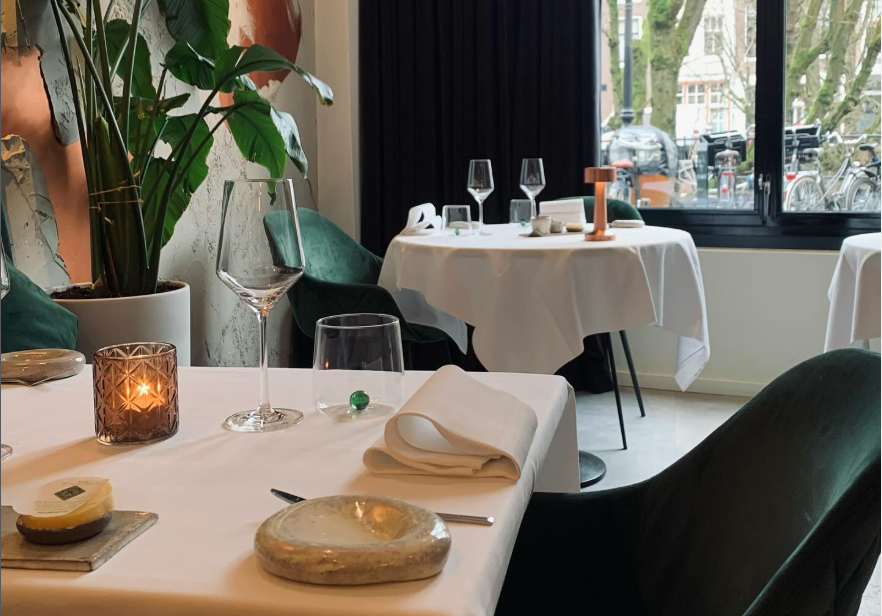Restaurant 273, located in Utrecht along the Oudegracht, skillfully combines the elegance of a modern dining concept with the charm of a monumental building from the 17th century. The smooth marble finishes, brushed copper accents, and deep green walls create a subtly elegant yet unthreatening atmosphere that makes entering feel like entering a movie frame. It’s the type of place where friends stay a little longer over another glass of expertly matched wine and couples lean in over tasting menus.
With a sleek Chef’s Table facing the open kitchen for the culinary curious, relaxed high-tops that provide a more casual intimacy, and tables with linen for the purists, the space is clearly divided. Despite having its roots in European modernism, the design somehow manages to strike a cozy balance between comfort and luxury.
Restaurant 273 – Quick Overview
| Feature | Details |
|---|---|
| Name | Restaurant 273 |
| Location | Oudegracht 273, 3511 NN Utrecht, Netherlands |
| Opened | June 16, 2021 |
| Cuisine | International fusion rooted in Dutch produce |
| Chef & Owner | Tommy den Hartog |
| Chef’s Table | 8-course tasting menu with open-kitchen access |
| Ambience | Deep green, copper, marble, and concrete tones with warm lighting |
| Dress Code | Smart Casual (headgear and sunglasses not allowed) |
| Accessibility | Fully wheelchair accessible including restrooms |
| Dog Policy | Dogs not allowed (except assistance dogs) |
| Website | restaurant273.com , Instagram |
| Contact | +31 (0)30 – 6336887 |
| Opening Hours | Thu–Fri: 18:00–21:00; Sat: 12:00–14:00 & 18:00–21:00; Sun: 12:00–18:30 |
A Chef Who Uses Both Local Instinct and Vision in Their Cooking
Chef-owner Tommy den Hartog is at the heart of Restaurant 273; his kitchen demonstrates a remarkable awareness of how flavors transcend national boundaries while remaining rooted in reality. In addition to his sense of patriotism, he creates menus with Dutch ingredients because he appreciates the underappreciated—terroir-driven vegetables, narrative seafood, and regionally-resonant meats.
Den Hartog’s cuisine is reminiscent of jazz in that it is both tradition-based and blatantly experimental. He uses more than just temperature and texture combinations to create effect. Each component contributes to an arc, a flavorful crescendo that seems both natural and well-planned. Imagine a lamb shoulder that is slow-cooked, shredded, and reassembled with the kind of attention to detail you’d expect in a French kitchen—but with Dutch soul. You might also imagine lightly torched mackerel, lifted by a hint of citrus.
The Reasons the Space Is Effective for Everyone
A particularly creative hospitality philosophy—that good food deserves good context—is reflected in the restaurant’s layout. Whether you’re sitting at the marble-topped Chef’s Table, watching the foam and caramelizing onions being plated, or enjoying a glass of wine and some crispy duck confit at one of the high tables across from the kitchen, you’re never merely a spectator but always an active participant.
The dining experience at Restaurant 273 feels noticeably more sophisticated yet remarkably cozy because of that interaction—without the pressure of performance. Visitors are welcomed into a rhythm of creation and curation in addition to being fed.
A Personal, Not Performed, Hospitality Approach
A guest with accessibility needs was escorted to their table during our visit with remarkable ease—no uncomfortable looks, no interruptions. This was real, flowing, and considerate hospitality—not staged. The staff moved with a cool accuracy that seemed more like upholding principles than following the rules.
The restaurant also strikes the ideal balance between formality and ease by upholding a smart-casual dress code. You are never under any obligation to participate, but you are encouraged to be your best self. In this refreshingly human take on fine dining, presence rather than exclusivity defines luxury.
An Ecological Stronghold—With Soul
Restaurant 273’s choice to emphasize local sourcing is especially advantageous in light of growing climate awareness. The kitchen’s reliance on Dutch produce encourages seasonal creativity while also drastically lowering its environmental impact. Every menu cycle turns into a chance to highlight local ingredients, transforming the commonplace into the remarkable, bringing beetroot to life, and making root vegetables the focal point.
This strategy is not only wise for the environment, but it also frees the imagination. Limitation encourages creativity, and when boundaries are intentionally set, the outcomes are strikingly successful, as demonstrated by Den Hartog’s cooking.
Beyond a Dining Establishment—A Model for the Future
As more diners look for greater significance in their meals in the years to come, Restaurant 273 provides a progressive illustration of how ethics, elegance, and experience can coexist. Its longevity will probably stem from the same principles that shaped it in the first place: care without compromise, creativity without chaos, and precision without pretense.
It provides a model worth studying for restaurateurs. It gives diners an incentive to come back. Additionally, it adds a distinctive element to Utrecht’s culinary map.

